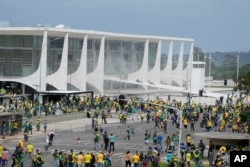The Brazilian authorities were investigating on Monday how it was possible for thousands of supporters of former President Jair Bolsonaro to assault, loot and cause great destruction to the buildings of Congress, the Supreme Court and the presidential palace in Brasilia.
The protesters demanded a military intervention that would restore the far-right Bolsonaro to power or expel the leftist president Luiz Inácio Lula da Silva, recently installed in office, in scenes of chaos and destruction that recalled the assault on the Capitol on January 6, 2021 from United States.
Mobs of people dressed in the green and yellow colors of the national flag smashed windows, toppled furniture, and threw computers and printers to the ground.
They also pierced a huge painting by Emiliano Di Cavalcanti in five points, overturned the U-shaped table where the Supreme Court judges meet, tore down the door of a judge’s office and vandalized an emblematic statue in front of the court.
The interiors of the monumental buildings were left in a state of ruin.
At a press conference Sunday night, Brazil’s institutional relations minister said buildings would be inspected for evidence such as fingerprints and images to hold the culprits to account, noting that the rioters apparently intended to take similar actions in the whole country.
Justice Minister Flávio Dino said the acts amounted to terrorism and a coup threat, and that authorities had begun to identify the people who paid for the buses that brought protesters to the capital.
“They will not succeed in destroying Brazilian democracy. We must say it emphatically, with all the firmness and conviction”, said Dino. “We will not accept the path of criminality to fight political battles in Brazil. A criminal is treated as a criminal.
So far, 300 people have been arrested, according to what the civil police of the federal district said on Twitter.
The results of Brazil’s election, the closest in three decades, were quickly recognized by politicians across the political spectrum, including some Bolsonaro allies, and dozens of governments.
However, Bolsonaro surprised almost everyone by disappearing from sight. He did not admit defeat or denounce fraud, although he and his party requested the annulment of millions of votes, a request promptly dismissed.
Brazilians have used electronic voting since 1996. Election security experts consider it a less secure system than hand-marked ballots because they do not leave an auditable paper record.
However, the Brazilian system is closely watched by the authorities and by international observers, who have never found evidence of manipulation to commit fraud.
Even so, Bolsonaro supporters rejected the results. They blocked roads and camped in front of military buildings, urging the armed forces to intervene.
The protests were largely peaceful, although isolated threats of terrorism, such as a bomb found in a fuel truck on the way to the Brasilia airport, raised security concerns.
US President Joe Biden described the riots as an “attack on democracy and the peaceful transfer of power in Brazil” in a tweet, saying he looked forward to continuing to work with Lula.
At a press conference from the state of Sao Paulo, Lula read a decree recently signed by the federal government to take over security in the federal district. “Fascist fanatics” and all those who financed their activities must be punished, he said.
The president also accused Bolsonaro of urging them to the insurrection.
Bolsonaro denied the accusation on Sunday night. In a tweet, he stated that peaceful protest is part of democracy, but vandalism and the invasion of public buildings were “exceptions to the norm.” He did not specifically mention the actions of the protesters in Brasilia.
Few officials worked in the main government buildings on a Sunday, and videos of the event showed a limited presence of the capital’s military police. That left many in Brazil wondering if the police had ignored the many warning signs, underestimated their capabilities, or been complicit in some way.
A video showed a group of protesters making their way through a police barricade after little struggle, with only a few officers using tear gas. In another, officers were seen standing while protesters stormed Congress.
“This was a serious mistake by the federal district government. It was a foretold tragedy,” said Thiago de Aragão, director of strategy at the Brasilia-based political consultancy Arko Advice. “Everyone knew that (the protesters) were coming to Brasilia. The federal district government was expected to prepare a response to protect the capital. They didn’t do any of that.”
In his press conference, Lula denounced “incompetence or bad faith” on the part of the police and promised that some would be punished.
The governor of the federal district, Ibaneis Rocha, confirmed on Twitter that he had dismissed the capital’s public security chief, Anderson Torres. Local media reported that Torres was in Orlando, United States, on vacation and that he denied having met Bolsonaro there.
Connect with the Voice of America! Subscribe to our channel Youtube and activate notifications, or follow us on social networks: Facebook, Twitter and instagram.
















